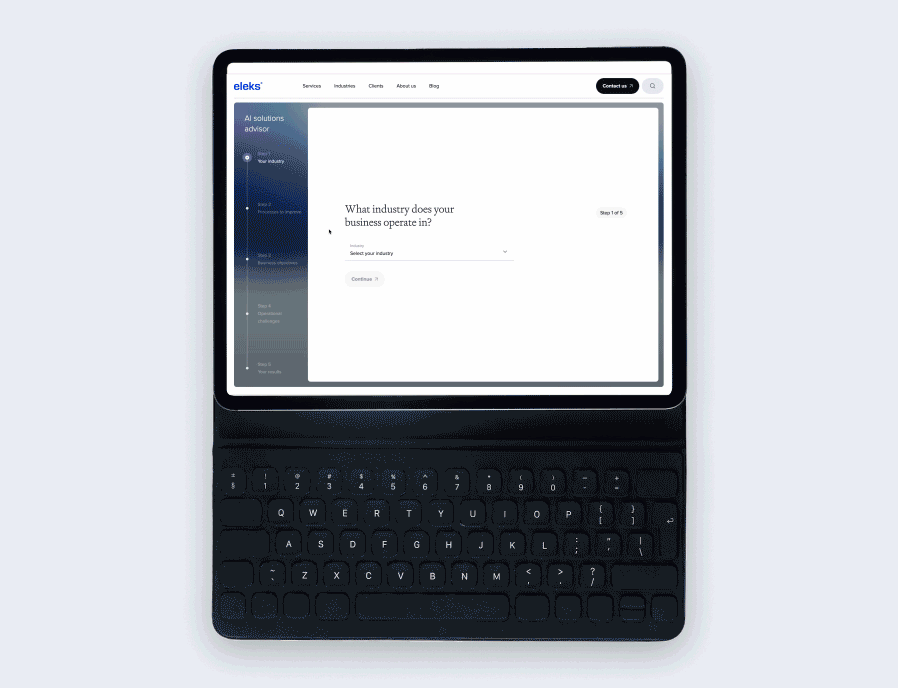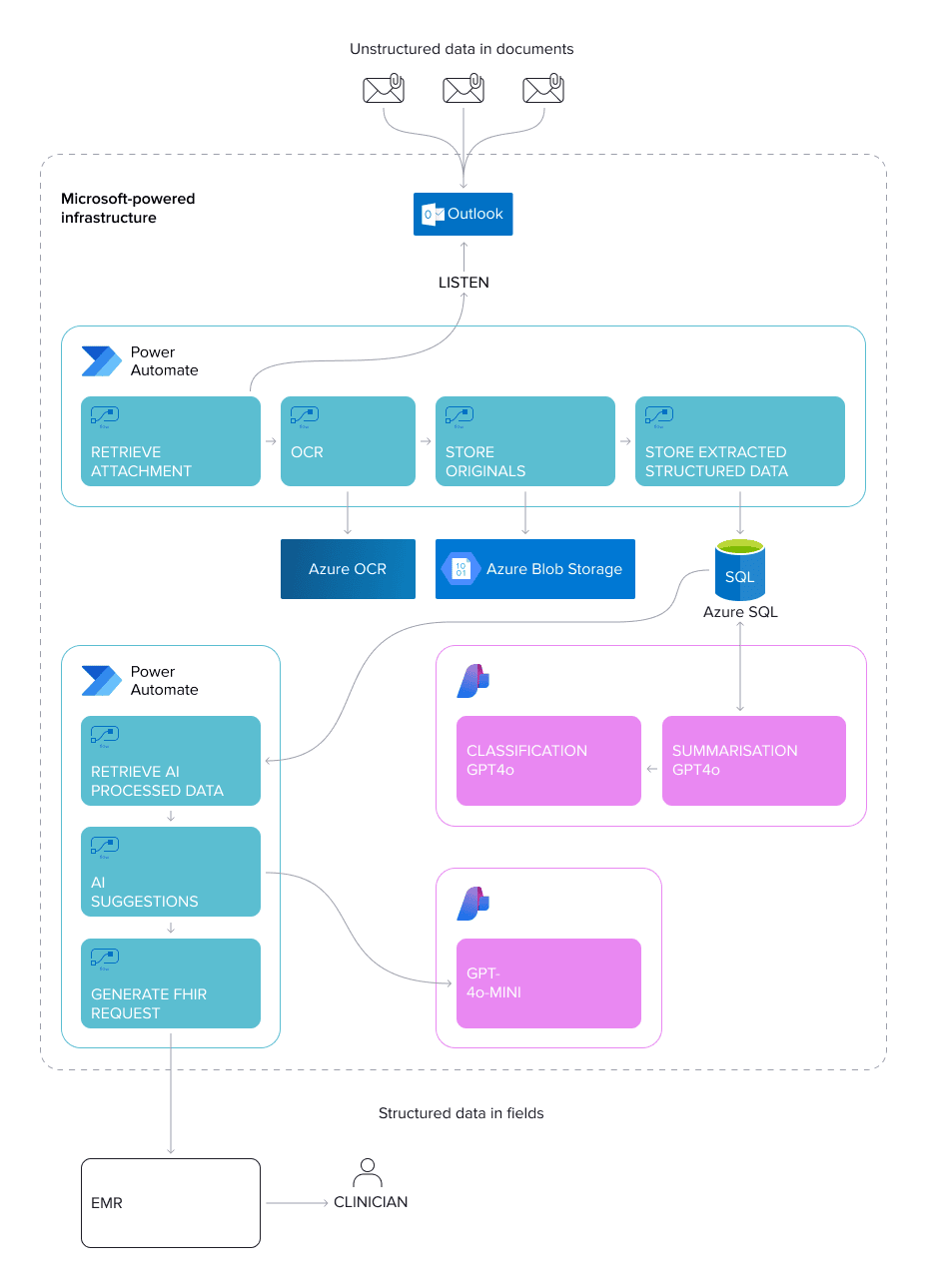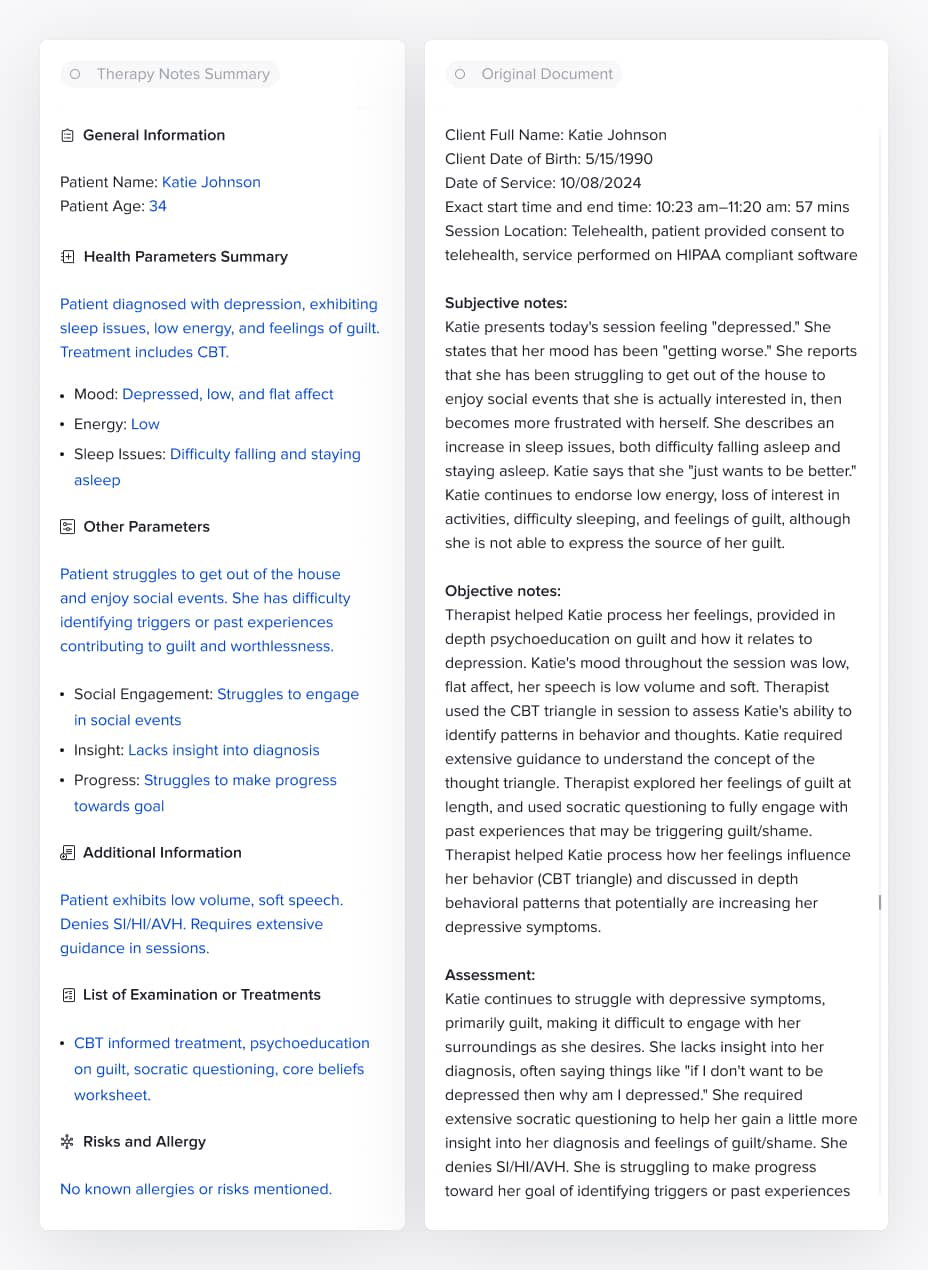
The healthcare industry is one of the most document-heavy sectors in the world. Every day, vast amounts of patient data, clinical reports, administrative records, and lab results are generated, creating an overwhelming number of documents for physicians, nurses, and other healthcare professionals to manage. Some of these documents can span dozens of pages.
To put this in perspective, 1 petabyte equals 1 million gigabytes. This means a single hospital produces as much data each year as approximately 50 million smartphones, each with 1 terabyte of storage. In fact, 95% of this data goes unused because most of this data is unstructured and uncategorised.
Moreover, reviewing medical records "manually" is time-consuming and can lead to missed information—mainly when healthcare providers have only 15-20 minutes for patient consultations.
- Typical challenges of manual data review in healthcare:
-
- Missed critical information: in cases with lots of unstructured data, it is very easy to overlook some essential information from patients' condition or history.
- Delayed decision-making: when doctors need to process a comprehensive set of records for analysis and communication, this can lead to delays in diagnosis or treatment.
- Less time with the patient: reading and comprehending reports takes away time from direct patient care, potentially compromising the quality of healthcare delivery.
Our team has developed a proof of concept (PoC) powered by generative AI (gen AI) to address these challenges. This solution not only creates patient data summaries that can be easily customised to meet the needs of various healthcare professionals, including doctors, nurses, and administrative staff, but also features a document classification capability that allows the support of different types of clinical documents. Let's examine our solution in more detail.

ELEKS’ AI-driven medical document summarisation
Our team aimed to develop a gen AI solution that could produce summaries of medical documents in a specific, predefined format suitable for healthcare professionals. For this PoC, our team researched, compared, and selected the most relevant open-to-use LLM model in compliance with healthcare industry regulations.
We have set the following guidelines for the PoC:
- PoC will use a generic predefined prompt to have a straightforward summary.
- We will focus on summarising specific healthcare documents, including nursing assessments, therapy notes, doctors' notes, plan of care (CMS form 485), lab tests, OASIS document, and discharge summary.
- All processes will adhere to HIPAA and GDPR regulations.
A major challenge in our process was acquiring document samples, given the sensitive nature of healthcare data. While we were able to find different document templates online, obtaining actual samples proved difficult. For this purpose, we used ChatGPT to generate some of the samples of these documents.
Additionally, operating within the healthcare domain necessitates strict adherence to data security protocols and compliance with regulations such as HIPAA and GDPR. This focus on data security and privacy is crucial, especially considering that 435 incidents of data breaches were reported in 2024, as of when this article was published.
Process overview: from document intake to AI-powered summarisation
Our medical document summarisation solution operates autonomously, activating as soon as new records are added to the database. The process begins when a medical document is received via email, triggering the initial processing phase.

We've observed that medical records are commonly stored as image files or PDFs. To address this, we've implemented an Optical Character Recognition (OCR) module. This was the necessary step, as it converted these documents from images and unrecognised text to recognised and searchable text.
Once the OCR process is finished and the document's content is recognised, it is stored in the database as discrete fields in text format, turning unstructured data into structured content.
Based on the kinds of clinical documents we encounter, a classification module has been included as part of the solution after an OCR was performed. For the classification of documents, we resort to generative AI and thus use the same model employed for summarisation. To this end, we have developed a separate prompt that describes each document type to match documents with its the respective type.
Once records have been recognised with OCR and classified, a summary of the document is automatically generated. At this stage, our solution supports summarisation on an individual document basis, meaning that each new document produces its standalone summary.
In cases where the type of a document is not recognised, the summarisation process will still continue to avoid leaving a document unsummarised.
ELEKS' solution: model selection and tech stack
While developing our PoC, we investigated a variety of LLMs to identify the best solution for generating summaries for medical documents. To determine the best model among all, we based our choice on three parameters: prompting capabilities, price and the final output of the summary.
We investigated both general-purposed models, such as GPT-3.5 Turbo and GPT-4, as well as specifically trained LLMs designed for medical summarisation, which we hosted ourselves, including DHEIVER/Medical Summarisation, MedLlama2, Meta-Llama/Meta-Llama-3.1-8B, and FalconsAI/Medical Summarisation. Let's take a closer look at them.
| Model name | Description |
|---|---|
| DHEIVER/Medical Summarisation | The DHEIVER/Medical Summarisation model is designed to produce concise, coherent summaries of medical documents, research papers, clinical notes, and other healthcare-related content. It is tailored to assist medical professionals, researchers, and healthcare organisations in summarising complex medical information. |
| MedLlama2 | MedLlama2, developed by Siraj Raval, is a model based on Llama 2 and trained using the MedQA dataset to answer medical-related questions. |
| Meta-Llama/Meta-Llama-3.1-8B | Meta's Llama 3.1 is a highly capable LLM with broad text generation, translation, and question-answering functionality. Its impressive ability to generate text makes it an excellent candidate for medical summarisation. |
| FalconsAI/Medical Summarisation | The FalconsAI/Medical Summarisation model, like DHEIVER, is tailored to produce concise summaries of medical documents. Its healthcare-focused design enables it to generate coherent summaries that meet the needs of medical professionals and researchers. |
While these models produced reasonable results, they lacked flexibility. We couldn't customise the output through prompting; we uploaded documents and waited for preconfigured summaries, and prompting capabilities was a key criteria for us. Generally, the results from these models weren't bad; we found that general models combined with effective prompting delivered significantly better outcomes.
This insight led us to choose Llama 3.1, a "self-hosted" LLM that gave us more control over the summarisation process and security, as information is "self-hosted." However, running such a powerful model required considerable computing resources, and maintaining it on a Virtual Machine with adequate power was costly. To address these challenges, we transitioned from "self-hosted" to Azure AI, which allowed us to switch models in minutes, pay only for what we use, and receive immediate output.
We have also tried ChatGPT 3.5 Turbo, but it is limited in terms of the size that will be analysed (a few pages max). After realising this, we decided to switch to a newer model, like GPT-4o.
Currently, we are relying on Azure AI, where we are running OpenAI's GPT-4o model. This solution gives us both the flexibility for prompting and the power to process and summarise large volumes of medical data.
In terms of the overall architecture, our PoC is entirely based on the Microsoft Azure platform. We utilise .NET technology in the backend to manage and adjust workflows. The combination of Azure AI and .NET is effective, flexible, and extendable for summarising medical information.

*All information presented in this image is fictional and used solely for demonstration purposes. No real personal data or protected health information has been disclosed.
Future vision: planned upgrades and innovations
First of all, we envision that the OCR module should be separated from the Summarisation module so that Summarisation will be an independent service. This will enable the deployment of the summarisation module, which aims to integrate different information sources, in particular, with EMR systems. These changes could save time on reading a huge amount of information, so specialists can dedicate more time to patient care.
As was described above, emails are a source of medical documents, but they cannot be used for a large amount of data and cannot be easily secured. Integration with external systems such as EMR or another database would allow healthcare providers to access and process a wide range of patient records. These changes could save time reading a lot of information, so specialists would spend more time on patient care. As part of this solution, we are converting the extracted data from the document into a FHIR document to simulate the final step in integrating with an actual EMR.
Currently, the developed system only creates a summary for one document at a time. The next logical step is to take the improvement to the next level by including the features for analysing and synthesising complex summaries from multiple documents about one particular patient. This feature will allow the healthcare specialists to have all necessary and crucial information available on "one page", where the one's profile is full and updated, which in turn can strengthen the treatment efficacy and decision-making as well.
Conclusions
Over only a couple of weeks, we created our AI-powered solution for medical document summarisation, which represents a significant step forward in addressing the challenges of information overload in healthcare. By leveraging advanced language models and cloud technologies, this tool offers healthcare professionals a way to quickly digest vast amounts of patient data, potentially improving decision-making and patient care.
One can easily see how other systems, formats, and models could be quickly integrated into this proof of concept. As we look to the future, the planned enhancements - including EMR integration and multi-document synthesis - promise to further streamline healthcare processes. This innovation exemplifies how AI can be harnessed to increase efficiency and improve patient outcomes by allowing healthcare providers to focus more on direct patient care. As the healthcare industry continues to evolve, solutions like this will play a crucial role in managing the ever-growing volume of medical data, ultimately contributing to a more effective and responsive healthcare system.

FAQs
Generative AI can automatically create summaries from various clinical documents, helping healthcare providers quickly digest large amounts of patient data. It also enhances medical imaging, assists in drug discovery, and supports personalised treatment plans.
Healthcare uses several types of AI, including machine learning (ML) for predictive analytics and diagnostics, conversational AI to providing 24/7, multilingual patient support, and generative AI to facilitate drug discovery and manage extensive amounts of data.
Generative AI can process various medical documents, including electronic health records (EHRs), physician notes, lab reports, radiology images, prescription records, and discharge summaries. It can also handle insurance claims, medical billing documents, and clinical trial data, enabling data extraction, summariіation, and report generation automation.
Related Insights








The breadth of knowledge and understanding that ELEKS has within its walls allows us to leverage that expertise to make superior deliverables for our customers. When you work with ELEKS, you are working with the top 1% of the aptitude and engineering excellence of the whole country.

Right from the start, we really liked ELEKS’ commitment and engagement. They came to us with their best people to try to understand our context, our business idea, and developed the first prototype with us. They were very professional and very customer oriented. I think, without ELEKS it probably would not have been possible to have such a successful product in such a short period of time.

ELEKS has been involved in the development of a number of our consumer-facing websites and mobile applications that allow our customers to easily track their shipments, get the information they need as well as stay in touch with us. We’ve appreciated the level of ELEKS’ expertise, responsiveness and attention to details.



